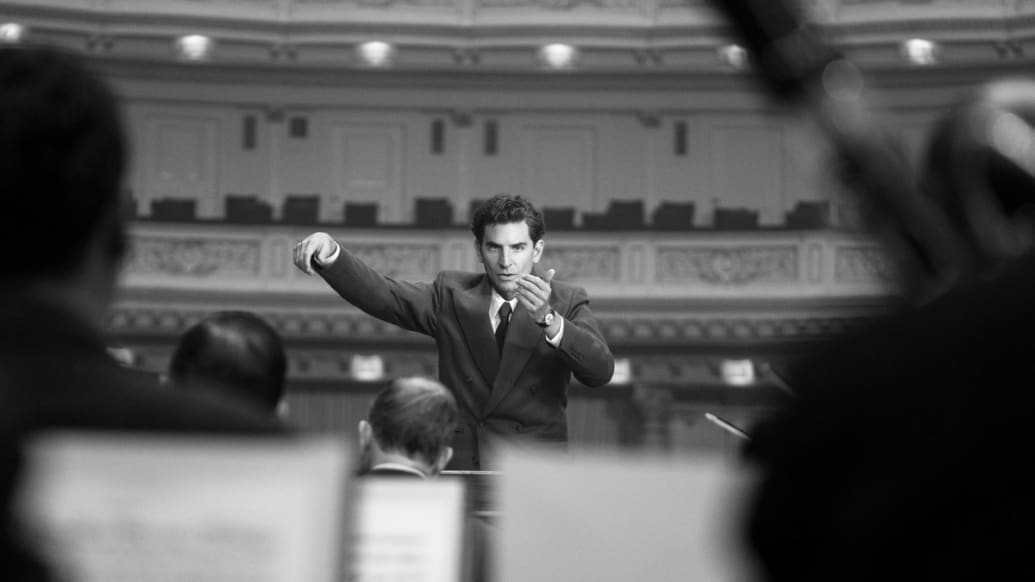VENICE, Italy—Leonard Bernstein is off the deep end—watch as he dives in! For Bradley Cooper’s second film as a director, he has once again given himself the role of a tortured artist supported through thick and thin by a woman who cannot fully understand his creative genius. But the miracle of Maestro is that something works here; the actors invest, there is feeling and heart and style, which amply compensate for some of the more iffy touches and longueurs.
Maestro, which premiered Saturday at the Venice Film Festival, begins in the most hackneyed of ways, with a misty-eyed Bernstein reminiscing about his late wife for a documentary being made about him in his later years. Everything here sets off alarm bells, from the corniness of that set-up to the dodgy SNL-style accent adopted by Cooper, coiffed and be-nosed and seemingly ready to let rip in the actin’ stakes.
And for long stretches things really do seem to be heading in the wrong direction, as the film steers headlong into all the pitfalls of the genre: famous characters are name-dropped; exposition clangs; there’s a saccharine meet-cute between Bernstein and his wife, Felicia Montealegre (Carey Mulligan). Maestro’s goals are uncertain: Are we watching a portrayal of musicianship, or a dissection of a couple, or is this a project about Bernstein’s public and private selves? It’s uncertain that Maestro quite gets there in terms of depicting Bernstein as a musician, and the sexuality stuff is handled quite weirdly, putting Bernstein’s homosexual activities on the back-burner.
What is it, then, that lifts off in Maestro? Partly it’s the film’s sheer weirdness. At its heart are two annoying characters, who seemingly bond over both being deeply annoying people: There is a great deal of complicit laughter between them over unfunny things; there is a sort of theatricality to both, and the film is intelligent in the way it shows the immediate harmony of this pairing, the way they have the same rhythm, dictating their impulses, body language, fits and starts of conversation, and private jokes.
In the central role, Cooper is reliably fine as Bernstein, astutely foreshadowing Bernstein’s fundamental decency, which clashes with his egotism. His voicework is not subtle, but it works well within this highly stylized film, which mixes black and white with plush colors, and it feeds nicely off Mulligan’s equally big performance.
Mulligan can be an overly busy actor, filling silences with gestures and tics, but in Maestro that tendency to fill out a character works miracles. She gives us a Felicia whose controlling instincts and misplaced certainties mask an ache, an insecurity. There is so much detail in Mulligan’s characterisation of Felicia, particularly in the way she leaps into conversation—an alacrity and presence of mind whose eventual erosion is all the more moving. In scenes where Montealegre struggles to summon her usual composure, we see the force of habit draining her vitality—this is a rich, lived-in performance.

Bradley Cooper as Leonard Bernstein in Maestro.
Jason McDonald/Netflix
Partly, what works in Maestro is its ambition and energy, the way it isn’t afraid to try things out. So an early one-shot—in reality a composite of different viewpoints—finds Bernstein sitting on his bed, talking on the phone, for what seems an eternity, framed in almost total obscurity by daylight framing a curtained windowpane. Then, upon receiving good news he leaps up, pulls the drapes across and light floods the room; Bernstein gaily pummels a young man sharing his bed, and rushes out the door, filmed from above as he passes along a succession of rooms and corridors, eventually emerging on the balcony of an opulent theater, where he is set to take up his first conducting gig.
Here, the camera whizzes around the atrium, before zipping back to Cooper as his good face radiates delight. This is fairly high-wire filmmaking, a little bit showy and perhaps trite in the way it signifies its intentions—but the showmanship works, because it is matched to a man who was as outsized as this.
There’s more: ballsy time-hopping scene transitions; an explanatory dance sequence; a finely written argument filmed in one-take, featuring an unexpected cameo by Charles Schulz’s Snoopy, and a few audacious musical sequences that take their merry time, demanding commitment from the viewer. Throughout, in fact, Maestro tests audiences’ staying power, particularly with a number of dialogue scenes filmed with a fixed camera, some of them at a startling distance from the action.
One disagreement between Felicia and Leonard is filmed from something like fifty meters away, their faces partly obscured by bits of garden: Why? What is intended here? Spectators can make up their own minds, but undoubtedly there’s a stubbornness at play here; a desire to do things differently. For instance, what a bizarre decision it is to foreground Bernstein’s heterosexual relationship: It pays off, eventually, but it feels like arriving at the character from an oblique angle.

Bradley Cooper as Leonard Bernstein in Maestro.
Jason McDonald/Netflix
Not everything is successful in this film—very far from it, in fact; its pleasure lies in how compromised and piecemeal it can be. Particularly in the opening courtship between Bernstein and Montealegre, a feeling of weariness can set in, as we wonder, really, what interest these two characters are supposed to hold for us, since the film has not made much of them outside their own self-contained relationship. Secondary characters are sketchily conceived, including an early boyfriend played by Matt Bomer with something that looks like regret. The film can be boring—especially in its final stretches, which drag out the couple’s last few days together, giving us something like five potential endings and never actually finishing.
Maestro will never be as big a crowd-pleaser as A Star is Born, and may find itself accused—perhaps not unfairly—of Oscar-baiting, with those two outsize performances at its heart—but something in the alchemy of cinema occasionally materializes here, bringing immense force to its project and leaving the viewer with many pleasingly unanswered questions to ponder.
Liked this review? Sign up to get our weekly See Skip newsletter every Tuesday and find out what new shows and movies are worth watching, and which aren’t.
Note: This article have been indexed to our site. We do not claim legitimacy, ownership or copyright of any of the content above. To see the article at original source Click Here













